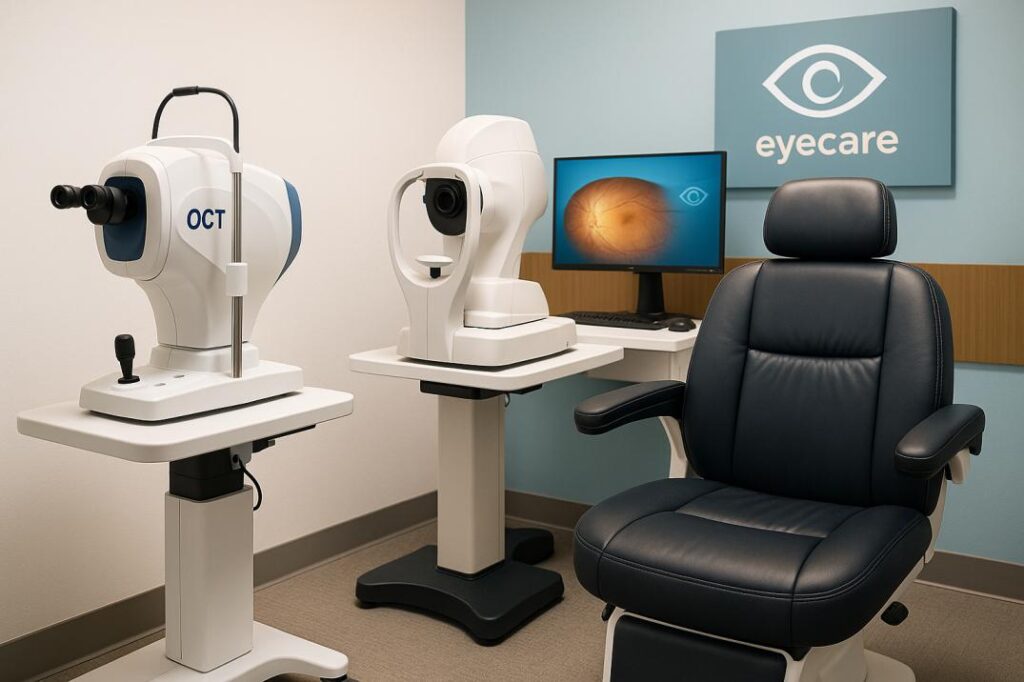What Are Cataracts? Symptoms & Solutions
Bottom Line Up Front: Cataracts are the leading cause of preventable blindness worldwide, affecting more than 25 million Americans over age 40 as of 2025. At Cannon EyeCare in Seattle’s University Village and Pike Place Market locations, our expert optometrists provide comprehensive cataract evaluations, co-management with leading Seattle surgeons, and personalized care that combines Midwestern hospitality with cutting-edge diagnostic technology. Early detection and proper management can preserve your vision and quality of life.
What Are Cataracts? Understanding This Common Eye Condition in Seattle
Cataracts occur when the natural lens in your eye becomes cloudy, much like looking through a fogged-up window. This cloudiness develops gradually as proteins in the lens break down and clump together, blocking light from passing clearly to your retina. While cataracts are most commonly associated with aging, they can affect people of all ages.
The lens of your eye works like a camera lens, focusing light onto the retina at the back of your eye. When cataracts form, this focusing ability becomes compromised, leading to blurred vision, increased glare sensitivity, and difficulty with daily activities like reading, driving, and recognizing faces.
At Cannon EyeCare, we’ve seen firsthand how cataracts can gradually impact our patients’ lives. That’s why we emphasize the importance of regular comprehensive eye exams to detect cataracts early, when treatment options are most effective.
Early Signs and Symptoms: When to Seek Professional Eye Care
Many people don’t realize they have cataracts in the early stages because symptoms develop slowly. However, recognizing these warning signs can help you seek timely care:
Visual Symptoms:
- Blurry, cloudy, or foggy vision that gradually worsens
- Increased sensitivity to light and glare, especially when driving at night
- Difficulty seeing in bright sunlight or artificial lighting
- Colors appear faded, yellowed, or less vibrant
- Double vision in one eye
- Frequent changes in eyeglass or contact lens prescriptions
Daily Life Impact:
- Difficulty reading small print, even with reading glasses
- Trouble recognizing faces or seeing facial expressions clearly
- Increased difficulty with night driving due to halos around lights
- Problems with depth perception or judging distances
- Needing brighter light for reading or close-up tasks
If you’re experiencing any of these symptoms, don’t wait. Our comprehensive eye exams at Cannon EyeCare can detect cataracts early and help determine the best course of action for preserving your vision.
How Do Cataracts Affect Daily Life?
Cataracts can significantly impact your quality of life, especially for active Seattle residents. Common challenges include:
- Driving difficulties: Especially problematic on Seattle’s cloudy days and during evening commutes
- Work performance: Computer screen glare and document reading become increasingly difficult
- Outdoor activities: Reduced vision can affect hiking, boating, and other Pacific Northwest activities
- Independence concerns: Simple tasks like cooking, shopping, and navigating become more challenging
Types of Cataracts: Understanding the Different Classifications
Not all cataracts are the same. Understanding the different types can help you better communicate with your eye care provider about your specific condition:
Age-Related Cataracts (Most Common):
- Nuclear Cataracts: Form in the center of the lens, causing nearsightedness initially but eventually leading to significant vision problems
- Cortical Cataracts: Develop around the edges of the lens, creating wedge-shaped opacities that can cause glare and contrast issues
- Posterior Subcapsular Cataracts: Form at the back of the lens, often progressing more rapidly and significantly affecting reading vision and night vision
Other Cataract Types:
- Congenital Cataracts: Present at birth or developing in childhood, often requiring prompt treatment
- Traumatic Cataracts: Resulting from eye injuries, which can occur years after the initial trauma
- Secondary Cataracts: Caused by other medical conditions like diabetes or medications such as corticosteroids
Causes and Risk Factors: Who’s Most Likely to Develop Cataracts
While aging is the primary cause of cataracts, several factors can increase your risk:
Age and Natural Aging: The proteins in your eye’s lens begin breaking down around age 40, though symptoms typically don’t appear until age 60 or later. By age 80, more than 50% of all Americans either have cataracts or have had cataract surgery.
Medical Conditions:
- Diabetes significantly increases cataract risk and can cause an earlier onset
- High blood pressure and cardiovascular disease
- Previous eye injuries or inflammation
- Severe dermatitis or other inflammatory conditions
Lifestyle Factors:
- Prolonged exposure to ultraviolet (UV) radiation without proper eye protection
- Smoking doubles the risk of cataract development
- Excessive alcohol consumption
- Poor nutrition is lacking in antioxidants
Medications: Long-term use of corticosteroids and certain other medications can accelerate cataract formation.
Seattle-Specific Risk Factors
Living in the Pacific Northwest presents unique considerations for cataract development:
- UV exposure: Despite frequent cloud cover, UV rays can still penetrate and affect your eyes
- Computer use: Seattle’s tech industry means many residents face increased screen time and digital eye strain
- Outdoor lifestyle: Hiking, skiing, and water activities require proper eye protection
- Air quality: Urban pollution can contribute to oxidative stress, affecting eye health
Advanced Diagnostic Technology at Cannon EyeCare
At our Seattle locations, we use state-of-the-art diagnostic equipment to detect and monitor cataracts with exceptional precision. Our comprehensive cataract evaluations include:
Detailed Visual Acuity Testing: We assess how cataracts are affecting your vision at various distances and lighting conditions, providing a complete picture of your visual function.
Advanced Retinal Photography: Our high-resolution imaging allows us to document the progression of cataracts and identify any other eye health concerns that might affect your treatment options.
Comprehensive Eye Health Screening: Beyond cataracts, we screen for glaucoma, macular degeneration, and diabetic retinopathy to ensure your overall eye health is optimized before any surgical intervention.
Thorough Medical History Review: Understanding your overall health, medications, and family history helps us provide personalized recommendations for your cataract care.
Treatment Options: From Early Management to Surgical Co-Management
The treatment approach for cataracts depends on the severity of your symptoms and how they impact your daily life:
Early-Stage Management: In the initial stages, we may recommend:
- Updated eyeglass or contact lens prescriptions
- Anti-glare coatings on lenses
- Improved lighting for reading and close work
- Magnifying devices for detailed tasks
- Regular monitoring to track progression
When Surgery Becomes Necessary: Cataract surgery is recommended when your vision loss significantly affects your quality of life, including:
- Difficulty driving safely, especially at night
- Problems reading or performing work tasks
- Trouble with daily activities like cooking or shopping
- Increased risk of falls due to poor vision
Surgical Co-Management: At Cannon EyeCare, we work closely with Seattle’s leading ophthalmologists to ensure seamless care throughout your surgical journey. Our co-management services include:
- Pre-surgical evaluations and measurements
- Coordinating with top local surgeons
- Post-operative care and monitoring
- Long-term follow-up to ensure optimal outcomes
Latest Research and Breakthrough Developments
The field of cataract treatment is rapidly evolving, with exciting developments on the horizon:
Revolutionary Protein Research: Recent studies from the National Institutes of Health have identified a protein called RNF114 that can reverse cataracts in animal models. This groundbreaking research, published in September 2024 in the Journal of Clinical Investigation, may lead to surgery-free cataract treatments in the future.
Advanced Surgical Techniques: Femtosecond laser-assisted cataract surgery now offers unprecedented precision, reducing recovery time and improving visual outcomes. Premium intraocular lenses can correct not only cataracts but also astigmatism and presbyopia.
Drug Development Progress: Researchers are developing eye drops containing lanosterol and other compounds that may slow or reverse cataract formation. While still in clinical trials, these treatments offer hope for non-surgical options.
Post-Surgery Care: What to Expect During Recovery
If you do require cataract surgery, proper post-operative care is crucial for optimal results:
Immediate Recovery (First 24-48 Hours):
- Rest with minimal visual strain
- Use prescribed eye drops as directed
- Wear protective eyewear
- Avoid driving until cleared by your surgeon
First Week:
- Gradual return to normal activities
- Continue prescribed medications
- Protect eyes from bright light with sunglasses
- Avoid strenuous exercise and heavy lifting
Complete Healing (2-6 Weeks):
- Vision continues to stabilize
- The final eyeglass prescription can be determined
- Return to all normal activities
- Schedule follow-up appointments as recommended
At Cannon EyeCare, we provide comprehensive post-operative care to ensure your recovery is smooth and your vision outcomes are optimal.
Cataract Surgery Cost and Insurance Coverage
Understanding the financial aspects of cataract treatment:
- Insurance coverage: Most health insurance plans, including Medicare, cover standard cataract surgery
- Premium options: Advanced technology lenses may require additional out-of-pocket costs
- Financing options: Many patients benefit from flexible payment plans
- Long-term value: Cataract surgery often eliminates the need for frequent prescription changes
Prevention Strategies: Protecting Your Vision for Life
While age-related cataracts can’t be completely prevented, you can take steps to reduce your risk and delay their onset:
Sun Protection: Wear high-quality sunglasses with 100% UV protection whenever you’re outdoors. Look for wraparound styles that block light from all angles.
Healthy Lifestyle Choices:
- Maintain a diet rich in antioxidants, including leafy greens, colorful fruits, and omega-3 fatty acids
- Don’t smoke, or quit if you currently smoke
- Limit alcohol consumption
- Exercise regularly to maintain overall health
Manage Chronic Conditions: Keep diabetes, high blood pressure, and other health conditions well-controlled with proper medical care.
Regular Eye Exams: Perhaps most importantly, schedule regular comprehensive eye exams. Early detection allows for better management and can identify other eye conditions that might complicate cataract treatment.
Why Choose Cannon EyeCare for Your Cataract Care
At Cannon EyeCare, we bring together the best of Midwestern hospitality and cutting-edge eye care technology. Our approach to cataract care includes:
Personalized, Unhurried Care: We take the time needed to thoroughly evaluate your condition, explain your options, and address all your concerns without rushing.
State-of-the-Art Technology: Our advanced diagnostic equipment ensures accurate diagnosis and precise monitoring of your cataract progression.
Comprehensive Health Screening: We examine not just your cataracts but your overall eye health, often detecting other conditions like glaucoma or macular degeneration.
Collaborative Care: We work closely with Seattle’s top ophthalmologists to ensure seamless care if surgery becomes necessary.
Convenient Locations: With offices in University Village and Pike Place Market, we’re easily accessible to Seattle professionals and families.
Taking Action: Your Next Steps
If you’re experiencing symptoms of cataracts or are due for a comprehensive eye exam, don’t delay seeking professional care. Early detection and proper management can preserve your vision and maintain your quality of life.
Schedule Your Comprehensive Eye Exam Today: Contact Cannon EyeCare to schedule a thorough evaluation. Our team will assess your vision, screen for cataracts and other eye conditions, and develop a personalized care plan tailored to your needs.
Questions to Ask During Your Visit:
- How advanced are my cataracts, and how quickly are they progressing?
- What treatment options are best for my lifestyle and visual needs?
- When might I need to consider surgery?
- How can I slow the progression of my cataracts?
- What other eye health concerns should I be aware of?
Remember, cataracts are highly treatable, and with proper care, you can maintain clear, comfortable vision throughout your life. At Cannon EyeCare, we’re committed to being your partner in lifelong eye health, providing the expert care and personal attention you deserve.
Ready to take the next step in your eye health journey? Contact Cannon EyeCare today to schedule your comprehensive cataract evaluation. Your vision is our priority, and we’re here to help you see clearly for years to come.
FAQs
-
Cataracts cause clouding of your eye’s natural lens, leading to blurry or cloudy vision. This makes daily activities like reading or driving more difficult and colors appear faded




